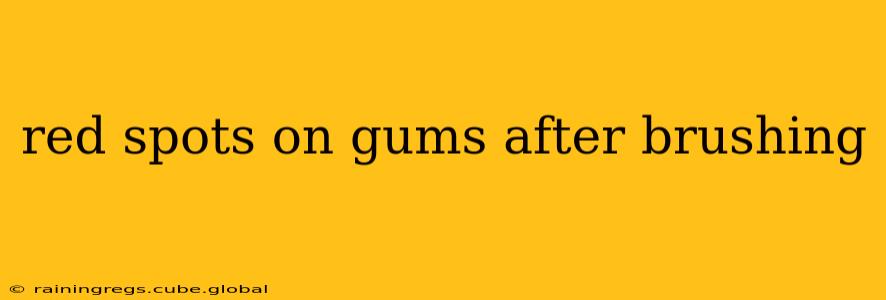Brushing your teeth, a cornerstone of oral hygiene, should leave your mouth feeling clean and refreshed. However, sometimes you might notice red spots on your gums after brushing. This can be alarming, but it's often a sign of a minor issue that can be easily addressed. However, it's crucial to understand the possible causes to ensure appropriate care. This article will delve into the common reasons behind red spots on gums after brushing, offering guidance on prevention and treatment.
What Causes Red Spots on Gums After Brushing?
Several factors can contribute to the appearance of red spots on your gums after brushing. These range from relatively benign issues to more serious conditions requiring professional dental attention.
1. Aggressive Brushing
This is perhaps the most common culprit. Brushing too hard or using a toothbrush with hard bristles can irritate the gum tissue, leading to redness, inflammation, and even bleeding. The pressure damages the delicate gum tissue, causing small capillaries to break and resulting in those noticeable red spots.
2. Gum Disease (Gingivitis)
Gingivitis is an early stage of gum disease characterized by inflamed and bleeding gums. If your gums bleed easily, even with gentle brushing, it's a strong indicator of gingivitis. The redness isn't limited to spots; it's often more widespread gum inflammation. Ignoring gingivitis can lead to more severe periodontal disease.
3. Vitamin Deficiency
Certain vitamin deficiencies, particularly vitamin C deficiency (scurvy), can weaken blood vessels and make gums more prone to bleeding and inflammation. This can manifest as red spots or more generalized gum redness.
4. Mouthwash Irritation
Some mouthwashes, especially those containing alcohol, can irritate sensitive gums, causing redness and spots. The strong chemical agents can disrupt the delicate balance of the oral microbiome.
5. Food Allergies
Rarely, a food allergy can trigger an inflammatory reaction in the mouth, including the gums. This may present as red spots or a more generalized reaction.
6. Certain Medications
Some medications can have oral side effects, including gum irritation and bleeding. Check your medication list and consult your doctor or dentist if you suspect this may be a contributing factor.
How Can I Prevent Red Spots on My Gums After Brushing?
Preventing red spots involves adopting gentle brushing techniques and maintaining excellent oral hygiene:
- Use a soft-bristled toothbrush: Hard bristles are too abrasive for sensitive gums.
- Brush gently: Use light, circular motions, avoiding aggressive scrubbing.
- Brush twice a day: This helps remove plaque and food particles that can irritate gums.
- Floss daily: Flossing removes plaque and food particles from between teeth, preventing gum inflammation.
- Rinse with a gentle mouthwash (alcohol-free): Choose a mouthwash specifically designed for sensitive gums.
- Eat a balanced diet: Ensure you're getting enough essential vitamins and nutrients.
When Should I See a Dentist About Red Spots on My Gums?
While occasional red spots might be caused by minor irritation, persistent or worsening redness, bleeding, swelling, or pain warrants a visit to your dentist. They can diagnose the underlying cause and recommend appropriate treatment. Don't hesitate to seek professional help if you notice any of these symptoms.
What are some home remedies for red spots on gums?
Several home remedies can offer temporary relief from gum irritation:
- Saltwater rinse: Dissolving a teaspoon of salt in warm water and rinsing your mouth several times a day can help soothe irritated gums.
- Aloe vera gel: Applying a small amount of aloe vera gel to the affected area can reduce inflammation. However, avoid swallowing the gel.
Disclaimer: This information is for educational purposes only and is not a substitute for professional medical advice. Always consult with a dentist or healthcare provider for diagnosis and treatment of any medical condition.
